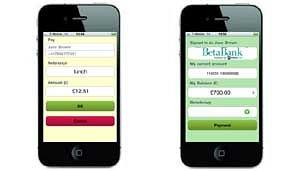Mobile money: Using your phone to transfer cash
- Published

Mobile-to-mobile transfers could become the main payment method for people and small businesses
By the start of next year, every bank customer in the country may have the ability to transfer cash between bank accounts, using an app on their mobile phone.
Barclays became the first bank to launch such an app for its own customers last week.
Now the wider banking industry - in the form of the Payments Council - is in the throes of setting up a database which can link all bank accounts to their owners' mobile phone numbers.
This in turn will let every bank or building society plug their own systems into the database while offering their own apps to their customers.
"There's clearly a great demand for mobile payments, and our work will ensure that banks of all shapes and sizes can offer their own competitive service to their customers," said Adrian Kamellard, chief executive of the Payments Council.
"Whether you want to pay a friend or your window cleaner, we are laying the foundation to enable mobile payments to become a mainstream option."
How it will work
Once this grand scheme is up and running it should all be fairly simple.
Anyone wishing to move money from their account to someone else's will have to have registered with their bank and to have activated its app on a mobile phone.
The app will let them select the person they want to pay; knowing their mobile phone number is key here.
The recipient must also be registered with their own bank so they can receive any such payments, even if they do not want to use an app to transfer any money on their own behalf.
A payment using the app will probably go like this:
choose the app on your smartphone screen
enter a Pin number or passcode to log on to the app
chose the recipient and select their mobile phone number
enter the amount to be paid and any reference details eg "lunch" or "loan"
enter a Pin number or passcode to confirm the transfer
the payment is then made, details will appear on the recipient's app, and your account will show your reduced balance.
Under the new system, the money will be transferred instantly from your bank account to the recipient's bank account, using the banking industry's "faster payments" system.
No more hanging around for three days for a cheque to clear.
So if you are at home one evening and receive a call from your son or daughter at university, begging you for an extra £100 to tide them over, you could move the money from your account to theirs within a minute or so.
"The point is not only that it is very secure but that it is fast as well," Mr Kamellard says.
"It offers customers a different way of behaving."
Challenge to credit cards
A key fact to remember here is that this system is about triggering a payment from one bank account to another.

This is not a cunning plan to do away with cheques, says Adrian Kamellard
Money will not be stored in electronic form in your smartphone, like a snazzier version of a foreign currency payment card or fare payment cards like Transport for London's Oyster card.
This is not, yet, about turning your mobile phone into an electronic wallet.
However the banking industry clearly thinks that mobile payments are the coming thing that will revolutionise personal banking habits.
Although telephone and internet banking are now well established, the use of smartphones - mobile phones that can access the internet - has been astonishingly fast.
Telecoms regulator Ofcom says that about 47% of all teenagers and about 25% of all adults in the UK own a smartphone.
Dave Birch, a payments expert at Consult Hyperion, says the biggest impact may not be on individuals but on small businesses such as shops.
"This could be adopted very quickly in the small business space - it may turn out to be more convenient and cheaper than accepting credit card payments," he says.
What could go wrong?
Banks will be free to design their own apps, as Barclays has already done, and decide if they want to charge for this new service or offer it free.
Minimum security requirements will be in place, such as the need for a Pin number or passcode to access the app and to make the payments.
Banks will have to be able to disable the app remotely if the phone is lost or stolen.
What if your phone is lost or destroyed, and you lose the use of your Sim card and mobile phone number in the process?
Once notified, the mobile networks will automatically tell the banks, and your old phone number will be disabled on the banking database, requiring you to re-register with a new mobile number.
Any mobile payments made to your account in the meantime will come back with a message that the phone number is no longer valid.
What if your phone is lost or stolen while the app is actually switched on?
Banks will be able to limit the size of any individual mobile payments, and limit the number of payments that can be made to or from any registered accounts.
So individual payments might have an upper limit of, say, £200.
And accounts might not be able to accept more than, say, £5,000 in any one day from mobile transfers.
End of the cheque?
The banking industry denies that this is all a cunning plan to ensure the demise of the cheque.
An outcry from MPs and consumer groups last year forced the banks into a highly embarrassing U-turn.
After planning to phase out the use of cheques by 2018, the banks had to promise to keep accepting them, more or less in perpetuity.
But about 25% of all cheques are written by individuals to pay other people, credit card bills, businesses such as tradesmen, and regular bills - for instance, from utilities.
If these payments switch wholesale to ones triggered by mobile phones, cheque use could drop even faster than before.
"Cheques are going to remain, that is what we have said time and time again, this is to provide an additional way of making payments," Mr Kamellard says.